- Home
- Barry Lyga
The Secret Sea Page 2
The Secret Sea Read online
Page 2
Dad shot a glare at Mom. He didn’t speak much Spanish, but he knew the bad words pretty well.
“Am I punished?” Zak asked, even though he knew the answer already.
“Are you kidding me?” Dad asked. “I can’t believe you even need to ask that question.”
“You are so punished,” Mom said, “that I don’t even know what the punishment is yet. I am—” She broke off, sighed, then said, “We are so angry at you right now that we can’t even begin to imagine an appropriate punishment.”
So maybe we just skip the punishment this time, Zak thought, but was way too smart to say out loud. His parents wouldn’t appreciate the humor. Not now.
“Go to your room,” Dad ordered. Zak nearly jumped out of his chair at the opportunity to get away from his angry parents. “Your mother and I will figure out a fitting punishment.”
“And then we’ll double it!” Mom shouted as Zak disappeared into the hallway.
Zak flung himself onto his bed with all the outrage he could muster. He didn’t deserve to be punished. He’d seen something. He’d heard something.
If there really was a flood, they’d be singing a different tune, he thought. I would probably be on TV as a hero for running and getting someone. And my parents would be all, “Oh my God, Zak, we thought we would lose you! You were so brave! We’re so glad you got away!”
Yeah.
If there had been a flood.
But there hadn’t.
There had been water, though. Right? The voice had told him to run before the pipe sprayed him. There was something going on, something strange, something he couldn’t identify. Even if he’d imagined the flood, he hadn’t imagined the pipe and the water.
What’s happening to me? Zak thought.
He rolled over onto his stomach. Even though it was still early, he was suddenly very tired, and the muted back-and-forth of his parents’ voices through the wall lulled him to the edge of sleep.
And his guardian angel’s voice—a sad, yearning, almost desperate whisper just as he drifted off: I’m sorry.
Or maybe he just imagined that.
THREE
I’m sorry was the most the guardian angel had ever said. It was actually a complete sentence. Usually, it was just a word or two, like Run! or Run now! Simple things. The voice couldn’t—or wouldn’t—say much. Sometimes Zak wasn’t even sure it was a voice so much as a sense of the word, the underlying imperative of it.
But as he woke in the middle of the night, he heard words—more than one or two—jumbled together, as though fighting each other for primacy.
—free—
He blinked sleep out of his eyes.
—God—
God?
—Zak!
He sat up straight and slapped at the light switch, turning on the lamp, a scream tucked right behind his lips, eager to explode forth.
His name. It had said his name.
And for the first time, the voice was familiar. Not merely as the voice of his guardian angel. He’d always known and trusted the voice. And now he knew why.
—the secrecy—
“Tommy?” he asked the empty room. And a chill raced up his spine before evaporating at the base of his skull.
Tommy. Tommy, his imaginary friend. Tommy, who had gone away around the same time Moira’s family moved to Brooklyn from Dublin. Zak had—if he was being honest—pretty much forgotten about his invisible buddy until this very moment, this moment of late-night/early-morning darkness and solitude. Being alone was nothing new to Zak. He hated it, hated the isolation and the sense that the world could have vanished outside his door and he wouldn’t know. Maybe it came from being an only child.
But there was a special kind of aloneness that only filled the wee hours and that only happened to children, although Zak was too young to understand that. Children know true isolation in a way that adults have forgotten, forgotten like scraped knees and loose teeth and …
And imaginary friends.
He shook his head. It was crazy. Tommy had been a figment of his imagination, nothing more. This kind of thing happened to only children, he knew. It was no big deal. Tommy, like most imaginary friends, eventually went away once Zak had actual friends to play with. He’d known Khalid forever, but they’d only started school together when Moira’s family arrived. And they’d become an inseparable trio and Tommy had gone away.
And now he was back.
—God—
Zak spun around in bed. The voice had been right behind—
—free—
He turned again. Nothing. No one there. He rolled out of bed and stood in the center of his room. He realized he was panting. He touched his chest by reflex; his heart pumped normally.
I’m losing my mind.
Nothing. No answer from the air.
“Tommy?” he whispered again. “Tommy, is that you?”
Zak!
—free—
Beware!—
—secrecy!
The chill was back, this time spreading down along his shoulder blades. Why was he so scared? Tommy had been his friend.
Yeah, and then you stopped talking to him. Maybe he’s really, really pissed.
That thought pummeled his chest; his heart thudded. He suddenly pictured a ghostly imaginary friend, angry and plotting revenge, coming back after years in limbo with …
With what? With a ghost knife? What could a ghost do to him, anyway?
“I’m sorry,” he said, not realizing how similar to his guardian angel’s voice his own sounded in that moment. “I’m sorry, Tommy.”
Was his guardian angel really an angel? Was it looking out for him, like when it warned him away from the man in the black coat? Or was it tricking him, like when it told him to run from the flood that wasn’t there?
Was it even—he shuddered—making him see things? It was one thing to hear an occasional voice or experience a sense of something. But to see a wave of water where there was none …
Am I losing my mind? Am I going crazy?
No. He couldn’t be. The pipe. The pipe had burst. Far from a flood, sure, but it was water from nowhere, like the flood he’d seen.
Unless it was just a coincidence. That was possible.
Maybe I am crazy.
His heart pounded. He was supposed to tell his mom or dad if he felt something—“Anything at all!” they’d insisted—wrong in his chest. He didn’t think this qualified. It was just plain old fear.
I’m not running to them like a baby. It’s all in your head, Zak. That’s all it is. It’s all dreams and … and garbage and nonsense, like Dad says.
He left the light on and crawled back into bed. Somehow, he sensed that he was alone again, and suddenly he was very tired.
Free. God.
What did it mean?
He fell asleep wondering.
* * *
It’s all in your head, he’d thought. But then again, crazy people had it “all in their heads,” too, didn’t they?
Zak didn’t think he was going crazy, but he also thought that crazy people probably didn’t think so, either.
He fidgeted with his breakfast. Dad had made huevos rancheros. The only time Zak got anything remotely Latin to eat was when Dad was cooking; Mom “refused to be a stereotype.” She made killer lasagna and chicken parm, but she didn’t know an enchilada from a taquito.
Dad didn’t have the cultural baggage, and he’d worked his way through college as a short-order cook in a Mexican restaurant in Greenwich Village. The huevos were particularly spicy today, just the way Zak liked them, but all he could manage was to push the eggs around in the bean sauce, thinking about the voice in his head, thinking about Tommy again for the first time in forever.
“Something wrong?” Dad asked, sliding into a seat across the table with his own plate of eggs.
Zak considered telling his father what he’d heard. But he figured after the disaster on the subway platform (or, rather, the non-disaster), that Dad was fed up
with hearing about things Zak had “imagined.”
“Nothing,” he muttered.
Dad sighed. “You know, you can be angry at your mom and me for punishing you, or you can think about what you did wrong and maybe direct some of that energy toward not getting punished again in the future.”
Dad was big on “directing energy” to the right places. Zak was tired of it, honestly. When he’d gotten up this morning, he’d been surprised to find Dad in the apartment at all—it was Mom’s turn this week. But Dad was on summer hours from the university; he could work from home. Zak’s punishment was a week’s grounding, so Dad would stay here, work from home, and make sure Zak went nowhere and had exactly zero fun.
Three more weeks until school started, and one-third of them was now a total waste.
Stupid guardian angel.
“Want to talk about it?” Dad asked. “Maybe tell me why you lied?”
Zak shrugged. There was no point to the talk. If he told his dad the truth, Dad wouldn’t believe him anyway—he’d already proved that by punishing Zak in the first place. So his only option other than just keeping his mouth shut was to really lie this time and come up with some reason why he’d told the “story” about the subway flooding.
Nah. Better just to say nothing.
“You know, Mom and I are just worried—”
“You’re always worried,” Zak snapped. “That’s all you ever do. Well, I’m fine. My heart is fine. I’m not dying or anything. I’m fine.”
Ah, crud. It had felt good—amazing, really—to go off on Dad like that, but there would be a price to pay. Zak managed to keep staring at Dad for a few seconds but quickly felt hot shame along his cheeks; as if controlled by some external force, his eyes drifted down to his plate. He’d stirred the huevos rancheros into a tumorous mass of black sludge.
Dad cleared his throat. “Well, fine. And if you’re not going to finish those huevos, just put your dish in the sink and head to your room.”
Zak did as he was told. His bedroom was cramped and small, but it was his. He was surrounded by the things he loved—old books, toys that he was too old for but secretly still adored, his iPad, his Xbox. Being confined to his room for a week wasn’t as big a torture as his parents liked to think it was.
A moment later Dad appeared in the doorway, arms folded over his chest. He pursed his lips, then held out a hand.
Zak sighed and handed over his Xbox controller.
“And the iPad,” Dad said.
Zak surrendered the iPad, too.
“What am I supposed to do all day?”
“Read a book,” Dad suggested, and closed the door.
Read a book. Yeah, right. Usually, Zak loved reading, but he’d read every book in the house (even a few of the adult books he wasn’t supposed to read), and he didn’t feel like rereading anything. He could have finished up his summer reading list, but that felt less like fun and more like work. Besides, he didn’t want the silence. He was petrified of the quiet, all of a sudden. Quiet meant that he would hear the voice if it came back.
When it came back. He somehow knew that it would definitely, definitely come back. And for the first time, that frightened him. He’d thought he’d understood the voice, the guardian angel. It had made him feel not just special but also powerful. For his whole life, his parents had treated him like something made of filament, like one of those lace cookies that fell apart if you picked them up too fast.
One more reason he hated solitude: nothing to do but to think. About his parents and their coddling. About his heart.
“You’re delicate,” they told him. “Your heart isn’t like other kids’. You have to be careful.”
Being alone sucked. When other people were around, he could sink into them, enjoy them. But when he was alone, he suffered a powerful, painful sensation that something was missing. It throbbed like a missing limb. He’d read that people who had arms or legs amputated could still feel them. That was how Zak felt when he was alone—as though something had been cut off him and stolen away, but he could still sense its weight. And he needed it back.
“You’re all we have”—another one of his parents’ favorite pronouncements.
He was tired of being all they had. Tired of being told to be careful. He felt fine. Sometimes he had little hiccups in his chest, but no big deal. Doctors and parents didn’t know everything.
They didn’t need to know everything.
He took his daily verapamil pill and settled in for the long, boring wait. The room was too quiet. Out in the living room, Dad would be propped up on the couch with his laptop, pecking away, his computer glasses perched comically at the end of his nose. Zak wanted to open his bedroom door just so that he could hear the occasional clack of the keys.
But then he had a better idea. He rummaged in his nightstand drawer and came up with his old iPod. It was three or four years old and didn’t really hold a charge anymore. He’d stopped playing with it when he’d gotten the iPad.
But as long as he left it plugged in, it should work. He fired up the video chat app.
Zak’s best friend was Khalid, and his other best friend was Moira. He hoped that he would never have to decide which one was his best, best friend, because that choice was impossible. He’d known Khalid longer—he couldn’t remember not knowing Khalid, in fact—but Moira was, well, she was Moira. She was smarter than any three kids at Wellington Academy combined … and she had the highest Xbox Live Gamerscore of anyone he knew, under the Gamertag DeadSeriousIrishGurl.
Years ago, the first time he’d visited Moira at home, he’d asked for a glass of water. Her mom, Mrs. O’Grady, had said, “Sure, laddie,” and Zak had felt as though he’d heard English being spoke for the first time. That night, he’d asked his mother why Mrs. O’Grady spoke the way she did.
“She’s from Ireland, cariño.” For once, the pet name from childhood hadn’t bothered him; he’d been too distracted. “It’s just her accent. The same way La-La has an accent.”
“La-La’s from Puerto Rico, not Ireland.”
“Different island is all.” Mom had shrugged and then settled in as Zak peppered her with a million questions about Ireland, the Irish, and red hair and green eyes.
The next day, he’d overheard his mother on the phone with La-La. “Oh, it’s definitely puppy love. Totally harmless at this age. It’s actually sort of cute.”
His cheeks had flamed at her words. It was ridiculous. Puppy love. His mother was clueless. Sure, he liked Mrs. O’Grady. What wasn’t to like? She was sweet and kind, with a cheerful smile and impossibly red hair and bright green eyes. And that lilting brogue. He couldn’t help it—he just liked being around her and hearing her voice. Moms didn’t know everything.
Moira could imitate her mom’s brogue—she had lost her traces of Irish accent after a year or so in the States—and occasionally said, “Sure, laddie,” in that special way when Zak asked a question, but he was reasonably certain she was just kidding around, not outright mocking him.
If he wanted to figure out the voices in his head, Moira was the one to call, the supergenius. But if he just wanted a sympathetic ear, it had to be Khalid.
He tapped Khalid’s name, and a moment later Khalid grinned out of the screen at Zak.
“Zak Attack!” Khalid hooted, and in that instant, Zak knew that he wouldn’t say anything at all about the dreams, the voices, the subway.
* * *
Khalid’s enthusiasm was like lighter fluid on kindling—once he started talking, it was impossible to be upset or melancholy. Within seconds of seeing Khalid on the tiny iPod screen, Zak had forgotten all about the previous night’s “visit.” When Khalid suggested they hang out, Zak shrugged it off with a short excuse about being grounded, offering no details. And the great thing about Khalid was that he never asked for details.
“I assume you don’t deserve your punishment,” Khalid said.
“Thanks for that.”
“Team Zak one-double-oh.”
; Khalid was fond of saying “one-double-oh” instead of “one hundred percent.” He thought it made him cool. Sometimes Zak agreed and sometimes he didn’t. Right now, he did.
“Can we Xbox it?” Khalid was saying.
“No, Dad took the controller.”
Khalid pulled a face. “Man, it sucks that your dad’s a gamer, too. Otherwise, he probably wouldn’t have even thought of that. You know what you need to do?”
“What do I need to do?”
Chortling, Khalid said, “Once you’re a free man again, we’ll go to the game store and buy another controller. And you hide it in your room somewhere. So the next time you’re grounded, your dad will take the controller that’s sitting out, and then you can use the hidden one, and we can totally gang up on Moira on Live.”
“You’re an evil genius,” Zak said in awe.
“Moira may hog all the As, but I’m devious,” Khalid said with modesty. “I should be a supervillain.”
“You totally should be.”
They spent some time figuring out what kind of supervillain Khalid should be, and then Zak heard his father stirring out in the hallway. He signed off quickly and shoved the iPod under his bed just as Dad knocked on his door.
“Yeah?”
Dad opened the door and poked his head in. “What are you doing in here?”
“Nothing.” Which wasn’t a lie; at that precise moment, Zak wasn’t doing anything at all. Dad hadn’t said, “What were you doing in here?”
“I thought I heard you talking.”
Zak shrugged. Not a lie because, well, no words. You couldn’t lie without words, right? Let Dad draw his own conclusions.
“I know you’re angry at your mom and me right now, but trust me—you’re getting off easy. If you’d pulled this on your grandfather…”
Zak tuned him out. When Dad started talking about growing up in Harlem in the eighties, Zak lost interest. Whatever.
“… so this is why we had to do this. Do you understand?”
Zak shrugged again. He knew his parents hated when he did that.
“Not talking? Fine. Maybe you’ll talk to the doctor.”
The doctor? “I’m not sick.”
“Oh, he does have a voice!” Dad shook his head. “Not Dr. Shamir. This is someone else. Someone to talk to about what you did yesterday.”

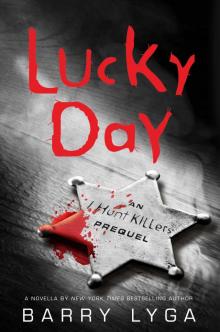 Lucky Day
Lucky Day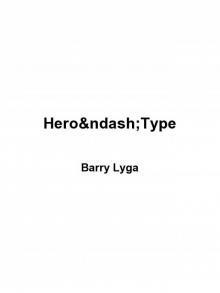 Hero-Type
Hero-Type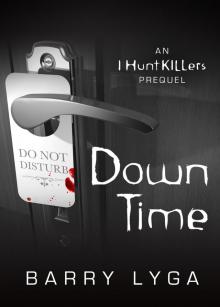 Down Time
Down Time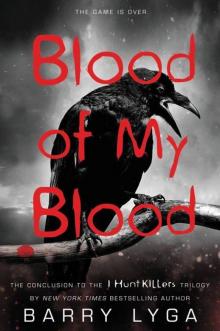 Blood of My Blood
Blood of My Blood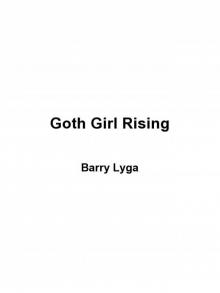 Goth Girl Rising
Goth Girl Rising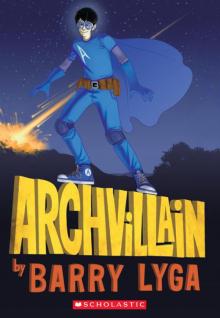 Archvillain
Archvillain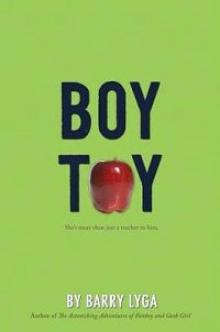 Boy Toy
Boy Toy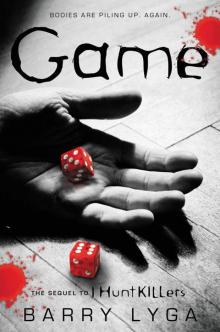 Game
Game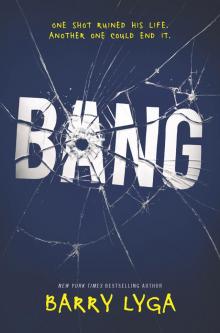 Bang
Bang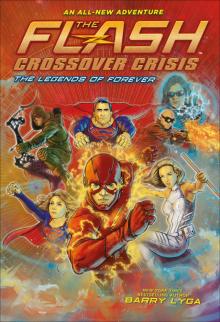 The Legends of Forever
The Legends of Forever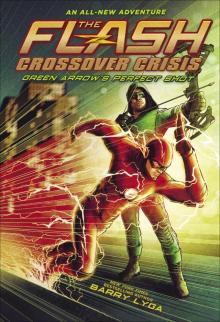 The Flash: Green Arrow's Perfect Shot
The Flash: Green Arrow's Perfect Shot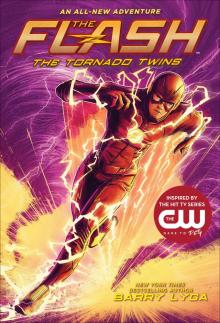 The Flash: The Tornado Twins
The Flash: The Tornado Twins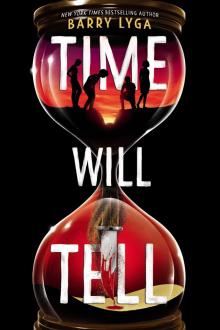 Time Will Tell
Time Will Tell The Secret Sea
The Secret Sea The Hive
The Hive Career Day
Career Day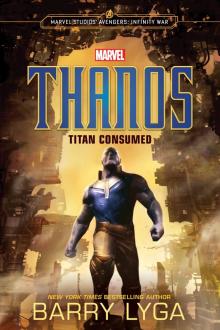 MARVEL's Avengers: Infinity War: Thanos
MARVEL's Avengers: Infinity War: Thanos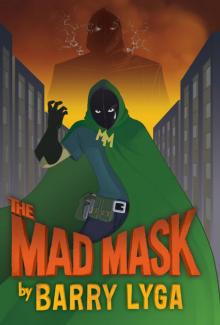 The Mad Mask
The Mad Mask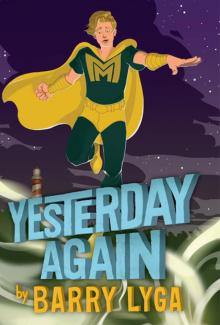 Yesterday Again
Yesterday Again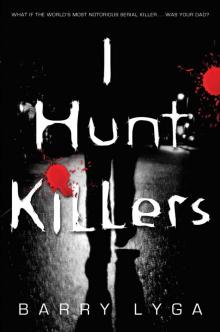 I Hunt Killers
I Hunt Killers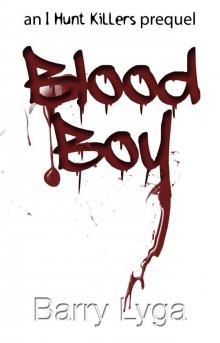 Blood Boy
Blood Boy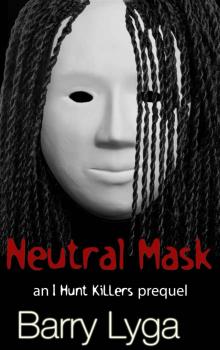 Neutral Mask
Neutral Mask The Astonishing Adventures of Fanboy and Goth Girl
The Astonishing Adventures of Fanboy and Goth Girl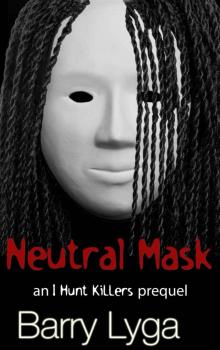 I Hunt Killers Neutral Mask
I Hunt Killers Neutral Mask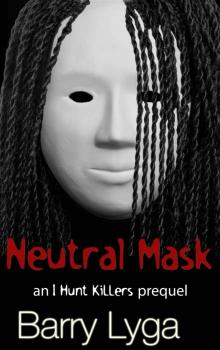 Neutral Mask: an I Hunt Killers prequel
Neutral Mask: an I Hunt Killers prequel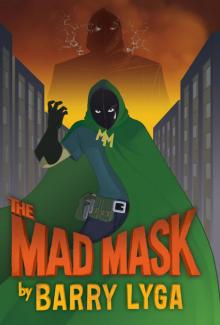 Mad Mask
Mad Mask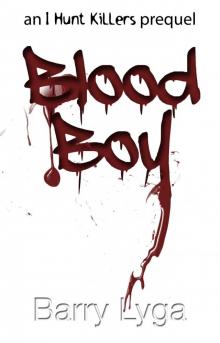 Blood Boy: an I Hunt Killers prequel
Blood Boy: an I Hunt Killers prequel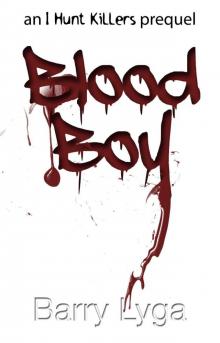 I Hunt Killers Blood Boy
I Hunt Killers Blood Boy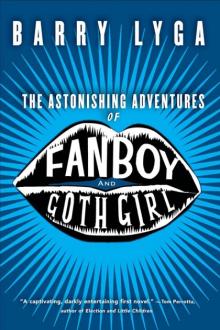 The Astonishing Adventures of Fan Boy and Goth Girl
The Astonishing Adventures of Fan Boy and Goth Girl